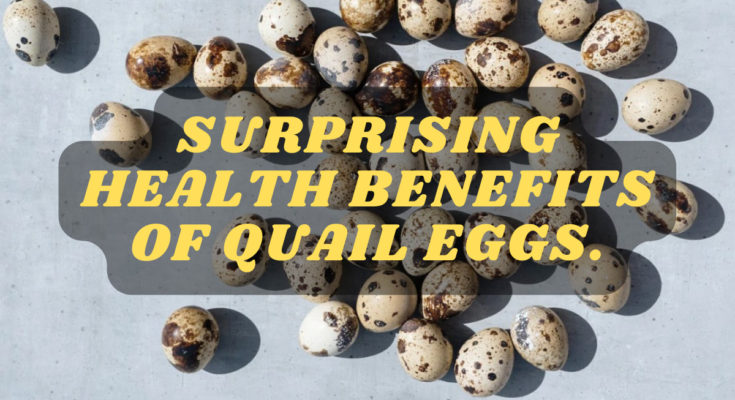QUAIL EGGS :-
Quail eggs are small eggs laid by various species of quail, which are small game birds. These eggs are popular in many cuisines around the world and are known for their delicate flavor and unique appearance.
Here are some key points about quail eggs:
1. Size and Appearance: Quail eggs are significantly smaller than chicken eggs, with an average size of about one-fourth to one-fifth the size of a chicken egg. They are typically speckled or mottled in appearance, with a cream or light brown color.
2. Nutritional Profile: Quail eggs are highly nutritious and packed with various essential nutrients. They are a good source of protein, vitamins (including vitamin B12, vitamin D, and vitamin A), minerals (such as iron, calcium, and phosphorus), and healthy fats.
3. Culinary Uses: Quail eggs are commonly used in a variety of culinary preparations. They can be boiled, fried, poached, or used in baking. Due to their small size, they are often used as garnishes, in appetizers, or as ingredients in salads, sushi, and other small bites.
4. Unique Flavor: Quail eggs have a rich and slightly gamey flavor compared to chicken eggs. Some describe the taste as being creamier and more robust. The yolk-to-white ratio in quail eggs is higher than in chicken eggs, making the yolk more prominent and flavorful.
5. Availability: Quail eggs can be found in many specialty grocery stores, Asian markets, and some regular supermarkets, depending on your location. They are often sold in small cartons or trays and are usually more expensive than chicken eggs.
6. Health Considerations: Quail eggs are generally safe to consume, but individuals with egg allergies should exercise caution. As with any food, proper storage, handling, and cooking practices are essential to prevent foodborne illnesses.
7. Culinary Tips: When cooking quail eggs, they are typically boiled for about 2 to 3 minutes for a soft-boiled texture or around 4 to 5 minutes for a hard-boiled consistency. They can be peeled like chicken eggs, although some find it slightly trickier due to their smaller size.
Quail eggs can be a delightful addition to various dishes, providing a unique twist and an aesthetic appeal. However, it’s always a good idea to consult recipes and cooking instructions specific to the dish you plan to make with quail eggs to ensure the best results.
HEALTH BENEFITS :-
Quail eggs offer several potential health benefits due to their nutrient content. While scientific studies specifically focused on quail eggs are limited, many of the benefits associated with quail eggs can be attributed to their nutritional profile. Here are some potential health benefits of consuming quail eggs:
1. Nutrient-rich: Quail eggs are a concentrated source of various essential nutrients. They are particularly high in protein, which is important for building and repairing tissues, supporting immune function, and maintaining overall health. Quail eggs also contain vitamins (such as B vitamins, vitamin A, and vitamin D), minerals (including iron, calcium, and phosphorus), and healthy fats.
2. Antioxidant properties: Quail eggs contain antioxidants that help protect the body against oxidative stress and damage caused by free radicals. Antioxidants play a role in reducing inflammation, promoting heart health, and potentially reducing the risk of chronic diseases.
3. Allergies and sensitivities: Some individuals who are allergic to chicken eggs may find that they can tolerate quail eggs as an alternative. Quail eggs have a different protein composition than chicken eggs, and this difference may make them suitable for those with egg allergies or sensitivities.
4. Digestive health: Quail eggs contain digestive enzymes that can aid in the breakdown and absorption of nutrients, potentially improving digestion. Additionally, the presence of phospholipids in quail eggs may contribute to the health of the digestive system.
5. Cholesterol content: Quail eggs have a lower cholesterol content compared to chicken eggs. While dietary cholesterol does not necessarily translate to high blood cholesterol levels for everyone, individuals with specific dietary restrictions or concerns about cholesterol intake may find quail eggs to be a favorable option.
6. Boosted nutrient absorption: Quail eggs are rich in vitamin D, which is important for calcium absorption and bone health. Vitamin D also plays a role in immune function, cell growth, and reducing inflammation.
It’s important to note that individual experiences may vary, and it’s always recommended to consult with a healthcare professional or registered dietitian before making significant changes to your diet, especially if you have specific health conditions or concerns.
While quail eggs offer potential health benefits, it’s important to incorporate them as part of a balanced and varied diet, along with other nutrient-rich foods, for optimal health.
NUTRITIONAL VALUE :-
Quail eggs are small in size but pack a nutritional punch. They are rich in essential nutrients and offer several health benefits. Here is an overview of the nutritional value of quail eggs per serving, which is typically considered as 5 quail eggs (approximately 50 grams):
- Calories: 71
- Protein: 6 grams
- Fat: 5 grams
- Carbohydrates: 0.4 grams
- Cholesterol: 424 milligrams
- Vitamin A: 380 International Units (IU)
- Vitamin B12: 1.1 micrograms
- Vitamin D: 4.2 International Units (IU)
- Calcium: 23 milligrams
- Iron: 1.5 milligrams
- Phosphorus: 117 milligrams
- Sodium: 104 milligrams
- Potassium: 126 milligrams
Quail eggs are notably high in protein, providing all the essential amino acids necessary for various bodily functions, including muscle growth and repair. They are also a good source of vitamin B12, which is important for red blood cell formation and nervous system function.
While quail eggs contain fats, they are primarily monounsaturated and polyunsaturated fats, including omega-3 and omega-6 fatty acids, which are considered heart-healthy fats. The cholesterol content of quail eggs is higher than in chicken eggs; however, current dietary guidelines indicate that dietary cholesterol has less impact on blood cholesterol levels for most individuals compared to saturated and trans fats.
Quail eggs are a source of essential minerals such as iron, which is vital for oxygen transport and energy production, and phosphorus, which plays a role in bone health and nutrient metabolism. They also contain calcium, potassium, and sodium, which are electrolytes involved in various physiological processes, including muscle function and fluid balance.
Additionally, quail eggs provide vitamins like vitamin A, which is essential for vision, immune function, and cell growth, and vitamin D, which promotes calcium absorption and bone health.
Keep in mind that these values are approximate and can vary depending on the size of the quail eggs and other factors. It’s always a good idea to refer to specific nutrition information provided on product packaging or consult a registered dietitian for more accurate and personalized information based on your specific needs.
USAGE :-
Quail eggs have a versatile range of uses in cooking and can be enjoyed in various ways. Here are some common ways to use quail eggs:
1. Boiled or Steamed: Boiling or steaming quail eggs is a popular method of preparation. They can be cooked to different levels of doneness, from soft-boiled with a runny yolk to hard-boiled with a fully set yolk. Boiled quail eggs can be enjoyed on their own as a snack or used in salads, appetizers, or as a garnish.
2. Fried: Quail eggs can be fried sunny-side up, over-easy, or as desired. They make a great addition to breakfast dishes such as fried rice, omelets, or served alongside bacon, toast, or sautéed vegetables.
3. Pickled: Pickled quail eggs are a popular snack and condiment in some cuisines. They are typically hard-boiled, peeled, and then immersed in a mixture of vinegar, herbs, and spices to infuse flavor. Pickled quail eggs can be enjoyed as a standalone snack or added to salads, charcuterie boards, or sandwiches.
4. Deviled: Quail eggs can be used as a unique twist on deviled eggs. After boiling and peeling the eggs, the yolks are mixed with mayonnaise, mustard, and other seasonings to create a flavorful filling. The mixture is then piped or spooned back into the halved egg whites, creating bite-sized deviled quail eggs.
5. Sushi and Sashimi: Quail eggs are commonly used in sushi and sashimi preparations. They can be placed on top of nigiri sushi, wrapped in thin slices of raw fish or seafood, or used as a topping for sushi rolls. The small size and delicate appearance of quail eggs make them an attractive addition to sushi presentations.
6. Salads and Appetizers: Quail eggs can be sliced or halved and added to salads, such as green salads, potato salads, or grain salads, to provide a protein boost and visual appeal. They can also be used as a garnish for appetizers, such as canapés or bruschetta, adding a touch of elegance and flavor.
7. Baking: Quail eggs can be used in baking recipes as a substitute for chicken eggs. Due to their small size, you may need to use multiple quail eggs to match the equivalent volume of chicken eggs in a recipe. They work well in cakes, pastries, custards, and other baked goods, adding richness and moisture.
When using quail eggs in recipes, it’s essential to handle them carefully due to their delicate shells. To crack the eggs, gently tap them on a flat surface or use a sharp knife to create a small opening.
Overall, quail eggs provide an opportunity for culinary creativity, whether used in traditional or inventive recipes. The small size and unique flavor of quail eggs can add a delightful touch to a wide range of dishes.



